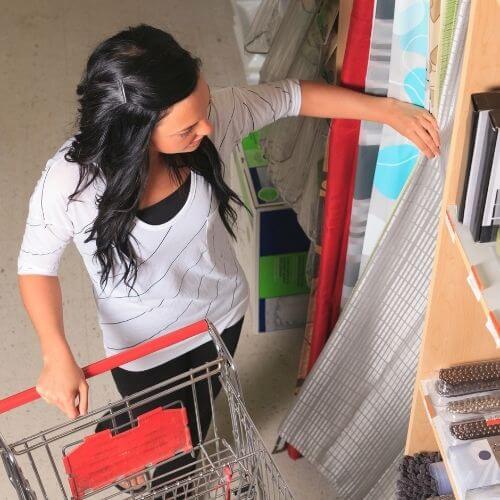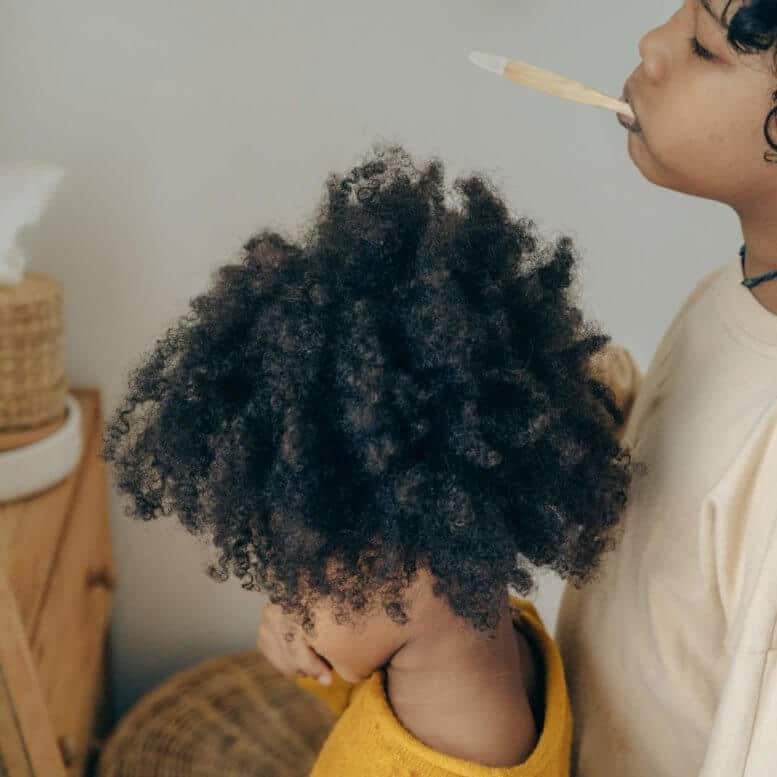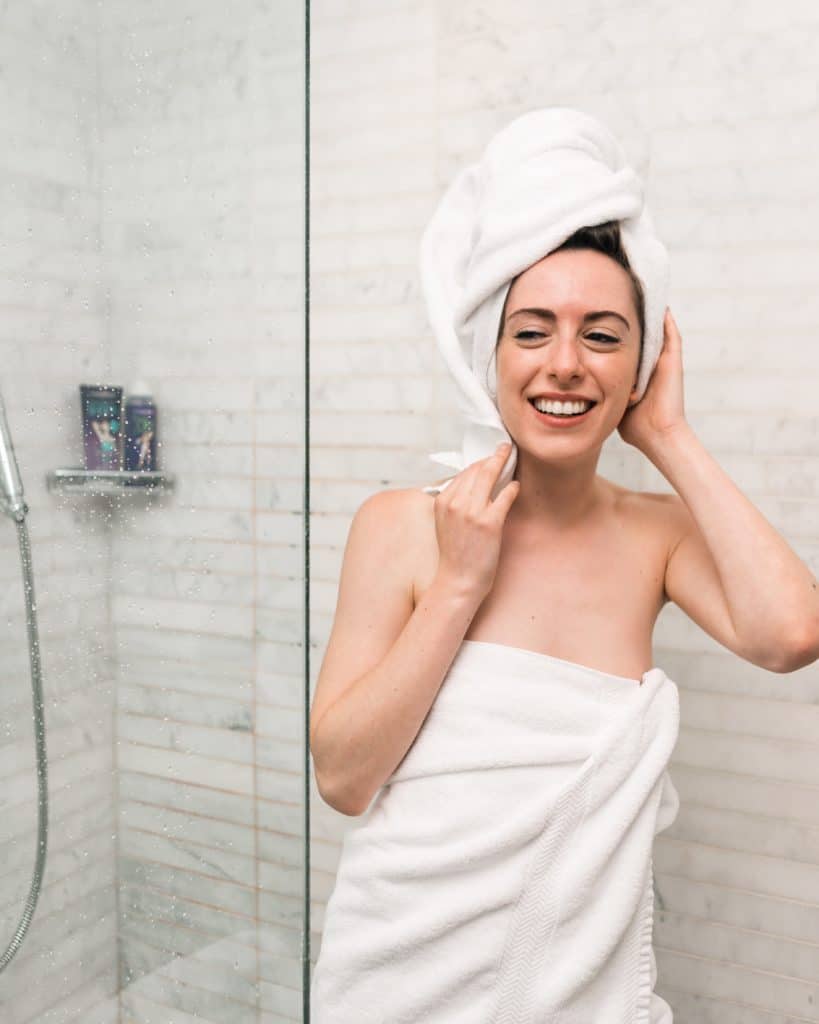If you landed on this page, chances are you’re looking to purchase some new quality items for your bathroom. What is PEVA shower curtain, and how does it compare to other shower curtain materials?
Having a shower curtain is usually necessary in order to prevent water from exiting the shower area. Wet or moist bathroom floors often lead to injuries and can attract mold and bacteria.
Not only are shower curtains necessary, but they can also add a nice aesthetic touch to your bathroom.
You will also be better off by choosing the curtain material that is easy to maintain and is not toxic.
To help you with that, we gathered all the useful information about PEVA shower curtains in this article.
What Is PEVA Shower Curtain Material?

The PEVA is the acronym that stands for polyethylene vinyl acetate. It’s durable, soft plastic that is commonly used to make shower curtains and shower curtain liners.
To further understand the properties of this material, we need to explain the properties of vinyl.
PEVA is derived from vinyl and therefore has some of its main features.
Vinyl is a man-made type of plastic made from chlorine and ethylene. It is specifically made to act as a cheaper but also durable everyday product.
It is often used in the construction industry for flooring, roofing, insulation, and other similar purposes. Vinyl even has its use in medicine and is often paired with other substances in order to achieve suitable materials.
Some of the main properties of vinyl are:
- Low cost
- Ease of production
- Water resistance
- Strong and durable
- Easily recycled (unlike other types of plastics)
- Environment-friendly
It’s also worth noting that PEVA, due to being derived from vinyl, goes under a different process compared to other plastics.
Some thermal and mechanical properties of PEVA include:
- Chlorine-free (sometimes called non-chlorinated vinyl)
- Waterproof
- Moistureproof
- Antimicrobial
- Eco-friendly
- Durable
- Non-toxic
Therefore, PEVA is a material commonly used to make:
- Shower curtains
- Plastic wraps
- Table coverings
- Car covers
- Mattress covers
- Shoes
- Toys
- Cosmetic bags
As a non-chlorinated version of vinyl, PEVA is considered less toxic than most types of plastics. That’s why you’ll see PEVA being used instead of PVC plastic in some cases.
We recommend PEVA shower curtains if you want to prevent getting your floor wet from the shower.
However, please note that the wet bathroom floor may indicate another plumbing problem that needs to be fixed. There are shower leaks on the floor, shower leaks through the ceiling, and shower leaks behind the walls that indicate a larger problem.
Is PEVA Toxic?

We just mentioned how PEVA curtains are considered less toxic than PVC. However, this still doesn’t mean they are completely non-toxic.
PVC contains chlorine, which means that it can produce toxic byproducts. By now, it’s common knowledge that PVC does contain toxic chemicals. [1]
This fact alone is used as a common selling point of PEVA material. What may be confusing at first is that both PVC and PEVA are derived from vinyl.
One may wonder – what makes the one material toxic and the other one non-toxic? It’s the fact that there are many types of vinyl out there, and some of them are more harmful than others.
That “plastic smell” one senses when opening something made out of PVC is an indicator of these toxic byproducts.
The smell will disappear, but the toxic chemicals can be released after that, especially when under high temperatures or cleaning solutions.
Since PEVA is made out of the type of vinyl that is non-toxic, it’s considered the best alternative to PVC.
Is PEVA Eco-friendly?
While some sources state that PEVA is an eco-friendly product, some others state that PEVA is not eco-friendly. This is why it’s very hard to answer this question properly.
However, the fact that PEVA is less toxic than other plastics, such as PVC, is a good step towards sustainability.
It’s also worth noting that PEVA is biodegradable.
But don’t ever throw it out and expect it to degrade naturally, as it won’t happen. Certain products are only able to decompose in facilities meant for that purpose. [3]
Is PEVA Recyclable?
Yes! PEVA is 100% recyclable. Because it contains less toxic materials, it’s more recyclable than PVC.
Just make sure to lend it to the facility that has the machines able to decompose PEVA.
Is PEVA Safe For Children & Babies?

Worrying if certain products and materials are safe for your baby or a child is normal. Babies are especially vulnerable because of their underdeveloped immune systems.
It’s safe to say that PEVA is considered generally safe for babies and children. It’s a better alternative to other PVC plastic products and contains way less harmful chemicals.
Despite that, certain people should still stay away from this material. These are the people who are prone to allergies and with weak immune systems.
The same goes for babies and children. If your child is sensitive to certain household items containing potentially harmful chemicals, it’s logical that you should stay away from using them.
Other than that, you shouldn’t worry too much if PEVA shower curtain can harm your children’s health. Keep your children away when you’re using cleaning solutions to clean the shower curtain.
It goes without saying, but this applies to other similar situations too. Children are curious, so they touch everything and often get things in their mouths.
Be super cautious of not letting your children near the surfaces cleaned with solutions containing harmful chemicals.
If you want to be sure you’re not exposing your baby to any harmful chemicals, there are also other shower curtain alternatives.
That being said, let’s take a look at how PEVA compares to other materials.
How PEVA Compares to Other Materials
As mentioned previously, the features of this material make it a fine alternative to other products. Those features include less toxicity, durability, and being waterproof and mold-proof.
Peva VC Polyester Shower Curtain
Polyester shower curtains are very similar to PEVA shower curtains. Like PEVA, they are very affordable, which is crucial when counting the bathroom remodel costs.
Typically they do very well in bathrooms with a lot of splashing water. This is because some polyester shower curtains of good quality have a weight to them, which allows them to stay in place.
Chances are, you won’t notice a huge difference in these materials the first time you compare them. Sometimes, the only way to know the difference is actually by reading the label.
Note that polyester shower curtains still contain VOCs, just like PEVA does. There is still not enough research to discern how much this can be harmful to someone’s health when in shower curtains.
However, the consequences VOCs (Volatile Organic Compounds) can have on someone’s health are already known. VOCs can cause anything from mild symptoms such as eye or throat irritability to even cancer. [4]
Other Shower Curtain Alternatives
If possible negative effects of PEVA material worry you, there are always other options on the market. These usually include shower curtains made from fabric and not plastic materials.
Let’s briefly go over some of them.
Cotton Shower Curtains
This is probably the most common and also the most affordable type of shower curtain. However, there’s a difference between most cotton shower curtains and organic cotton ones.
As cotton is grown and produced in large quantities, it usually contains pesticides. These toxic ingredients remain present in the material even after it’s made into a shower curtain.
Luckily, there are options out there with the organic cotton material. These shower curtains are made from cotton that is naturally grown without the use of toxic pesticides.
But whichever cotton shower curtain you choose, know that it’s not waterproof or mold-proof.
Hemp Shower Curtains
In contrast to cotton, hemp shower curtains are mold-resistant. Not only that, they are resistant to the growth of any bacteria, which is very beneficial for a shower curtain!
You can’t always know how a plant is grown in order to understand the amount of possible toxicity in the material.
But, hemp shower curtains are mostly made out of a plant grown without the use of pesticides. Hemp shower curtains are also known to be highly durable.
Linen Shower Curtains

Linen shower curtains, like hemp ones, are easily made of a plant that is grown without the use of pesticides.
Nevertheless, like many other shower curtains made of natural materials, it’s unfortunately not waterproof or antibacterial.
Also, keep in mind that natural shower curtains do get wet because they are not waterproof. However, their advantage is that they can be easily cleaned in a washing machine.
With PEVA, you want to avoid washing the shower curtain in the washing machine. It’s possible that the curtain won’t be harmed in the process, but it’s safer to just clean it by hand.
What Material to Choose for a Shower Curtain?
Let’s give you some tips to help you with deciding which shower curtain is the right one for you.
Knowing what to look for in a shower curtain is crucial in meeting all the important needs of your household.
- No Toxicity Warnings
When a shower curtain has a toxicity warning, you should stay away from it. This simple rule applies whether you have children and pets in your household or not.
Also, some shower curtain labels won’t include warnings but will include the product description. In this description, you can find what the material is made of and decide for yourself.
Keep in mind that plastic products like PEVA can emit some toxic materials when exposed to high temperatures or other chemicals.
- Recyclable
This may not be something that first comes to mind, but it’s best to buy recyclable products when you can. Purchasing a shower curtain is one of those occasions.
That’s because there are many shower curtain materials out there that are recyclable and more sustainable than PVC. One of them is certainly PEVA
- Shower Liners
Shower curtain liners are what sometimes comes with a shower curtain itself – but this is not always the case.
Liners are the fabric added onto the edge of a shower curtain, and they can come in many different materials as well. Their purpose is to add weight to the shower curtain and keep it in place while you shower.
It’s very common for curtains from natural materials to have a plastic shower liner. This is because mold collects and grows at the edge of the shower curtain.
Products like PEVA liners are more successful in stopping mold and bacterial growth than liners from natural materials. That’s because PEVA is waterproof.
- Size and Weight
When searching for a proper shower curtain material, we sometimes forget that getting an adequate size is equally as important.
You don’t want to get a shower curtain that is too short or not wide enough. Size the shower curtain with the size of shower you have.
- Machine-washable
Not all shower curtains are machine-washable. The option to just throw a dirty shower curtain in a machine is more than beneficial.
You don’t want to spend hours scrubbing your dirty shower curtain. Also, throwing away the curtain and just getting a new one is bad for the environment and not necessary!
The truth is – most shower curtain materials won’t be harmed by the washing machine cycle. However, with plastic-like materials such as PEVA, you want to avoid using very high temperatures.
The Verdict
Now you know what is PEVA shower curtain and what makes it so special. It’s highly durable, waterproof, antimicrobial, easy to clean, recyclable, and affordable as well!
If you are looking for some safer options, shower curtains made of cotton, hemp, and linen are also worth considering. However, keep in mind that these are not waterproof and can easily attract mold and bacteria.

Michael Davis is a heating & plumbing expert who currently works as independent contractor in SC. He also writes for Plumbertip.
For almost 10 years he worked on various plumbing tasks across South Carolina.


